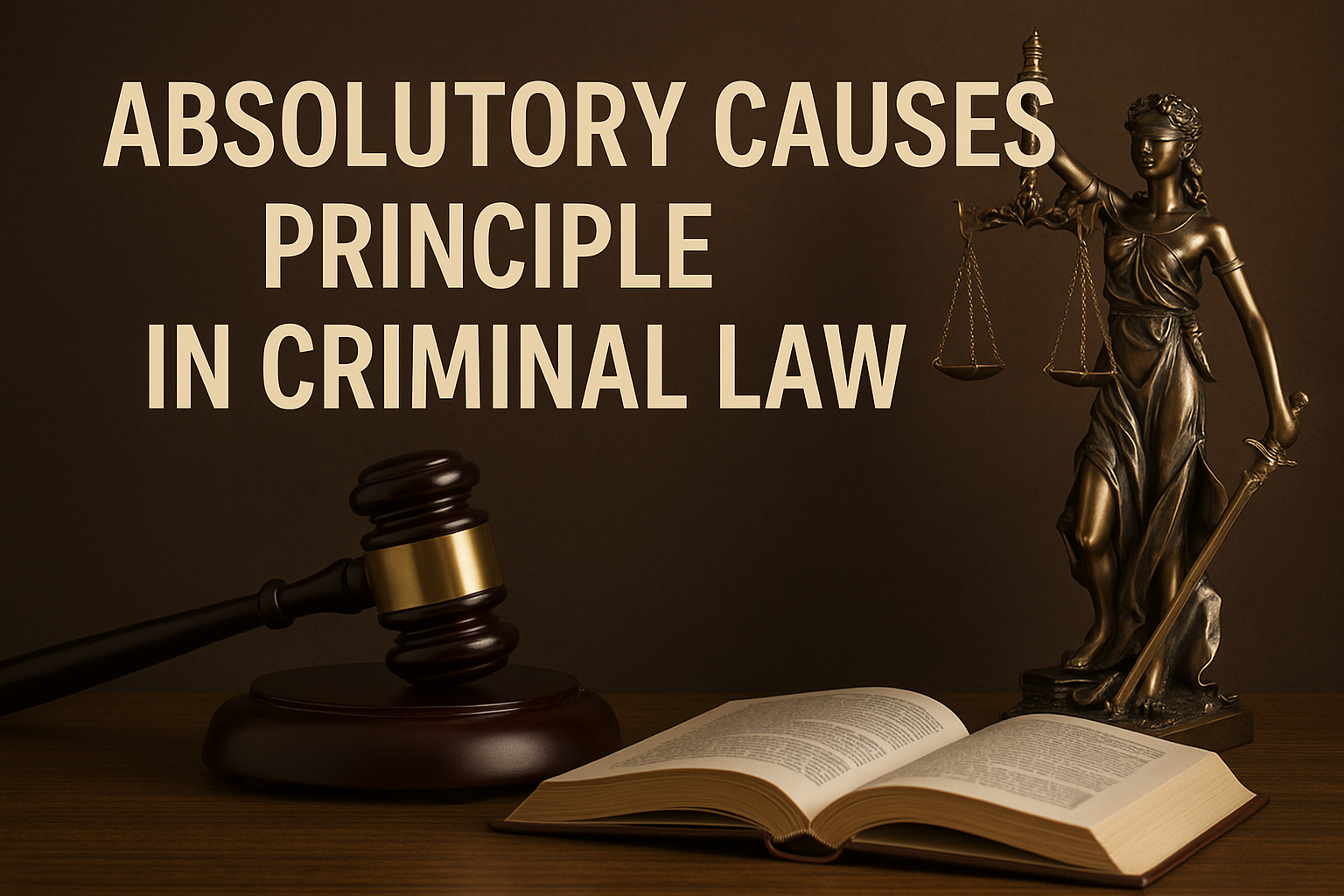In criminal law, the concept of “absolutory causes” occupies a unique and significant position. While the law is generally designed to punish those who commit crimes, there are exceptional situations where, for reasons of public policy, sentiment, or the preservation of social harmony, the law chooses not to impose a penalty—even if all the elements of a crime are present. These situations are known as absolutory causes.
This article discusses the absolutory causes in criminal law. It will explore its respective definition, legal basis, rationale, and practical application, drawing from the Revised Penal Code, relevant jurisprudence, and established legal doctrines.
What is an Absolutory Cause?
An absolutory cause is a legal situation where an act committed is technically a crime—meaning all its elements are present—but the law, for reasons of public policy or sentiment, does not impose a penalty on the offender. In other words, the act is not justified or excused, but the law chooses to absolve the offender from criminal liability.
To put it simply, an absolutory cause does not erase the criminal nature of the act, but it prevents the imposition of a criminal penalty. The rationale is often to promote higher social values, such as family harmony, or to recognize the unique circumstances that mitigate the need for punishment.
“An absolutory cause is present ‘where the act committed is a crime but for reasons of public policy and sentiment there is no penalty imposed.’”1
Legal Basis: The Revised Penal Code
The primary legal basis for absolutory causes in the Philippines is the Revised Penal Code (RPC), particularly in its general provisions and in specific articles that enumerate circumstances where criminal liability is not incurred or is mitigated.
Article 11: Justifying Circumstances
Article 11 of the RPC lists justifying circumstances, which are technically not absolutory causes but are often discussed alongside them. In justifying circumstances, the act is not considered a crime at all because it is done in accordance with law (e.g., self-defense).
“The following do not incur any criminal liability:Anyone who acts in defense of his person or rights, provided that the following circumstances concur: First. Unlawful aggression; Second. Reasonable necessity of the means employed to prevent or repel it; Third. Lack of sufficient provocation on the part of the person defending himself.”2
Article 12: Exempting Circumstances
Article 12 enumerates exempting circumstances, where the act is a crime but the actor is not criminally liable due to lack of voluntariness (e.g., insanity, minority).
Article 20, 247, and 332: Specific Absolutory Causes
Certain articles in the RPC specifically provide for absolutory causes:
- Article 20: Absolutory cause for accessories who are relatives of the principal.
- Article 247: Death or physical injuries inflicted under exceptional circumstances (e.g., a spouse caught in the act of sexual intercourse).
- Article 332: Exemption from criminal liability for theft, swindling, and malicious mischief among certain family members.
Rationale Behind Absolutory Causes
The rationale for absolutory causes is rooted in public policy, social sentiment, and the desire to promote higher values such as family unity, honor, and the avoidance of scandal. The law recognizes that, in certain situations, the imposition of a criminal penalty would do more harm than good, or would be contrary to the collective sense of justice.
For example, the law may choose not to punish a parent who, in a fit of rage, kills a person caught in the act of having sexual intercourse with his or her child. The law acknowledges the overwhelming human emotion and the need to vindicate family honor.
Similarly, the law may exempt from criminal liability those who commit property crimes against close family members, to preserve family harmony and avoid public scandal.
Types of Absolutory Causes
Absolutory causes can be classified into two broad categories:
- General Absolutory Causes: Those that apply to all crimes under certain circumstances (e.g., instigation, spontaneous desistance).
- Specific Absolutory Causes: Those that apply only to particular crimes or situations, as expressly provided by law.
Let us discuss the most important specific absolutory causes under the Revised Penal Code.
Article 20: Accessories Who Are Relatives
Article 20 of the RPC provides that accessories to a crime are exempt from criminal liability if they are related to the principal offender as spouse, ascendant, descendant, legitimate, natural, or adopted brother, sister, or relative by affinity within the same degrees.
The rationale is to avoid compelling family members to testify or act against each other, thus preserving family solidarity.
Article 247: Death or Physical Injuries Inflicted Under Exceptional Circumstances
Article 247 is a classic example of an absolutory cause. It provides that a legally married person who surprises his or her spouse in the act of sexual intercourse with another person and kills any or both of them in the act or immediately thereafter, or inflicts serious physical injury, shall only suffer the penalty of destierro (exile), not imprisonment.
“Art. 247. Death or physical injuries inflicted under exceptional circumstances. Any legally married person who, having surprised his spouse in the act of committing sexual intercourse with another person, shall kill any of them or both of them in the act or immediately thereafter, or shall inflict upon them any serious physical injury, shall suffer the penalty of destierro. … An absolutory cause is present ‘where the act committed is a crime but for reasons of public policy and sentiment there is no penalty imposed.’ Article 247 is an example of an absolutory cause.”3
Elements of Article 247
- The offender is legally married.
- The offender surprises his or her spouse in the act of sexual intercourse with another person.
- The offender kills any or both of them, or inflicts serious physical injury, in the act or immediately thereafter.
If these elements are present, the law imposes only the penalty of destierro, recognizing the overwhelming passion and loss of reason caused by the situation.
Application in Jurisprudence
In People vs. Oyanib (2001), the Supreme Court recognized the applicability of Article 247, emphasizing that the law is strict and requires that the killing or injury be done in the act or immediately thereafter.4
Article 332: Exemption from Criminal Liability for Certain Property Crimes Among Relatives
Article 332 provides that no criminal, but only civil liability, shall result from the commission of theft, swindling (estafa), or malicious mischief committed or caused mutually by certain family members.
The relatives covered are:
- Spouses, ascendants and descendants, or relatives by affinity in the same line.
The widowed spouse with respect to the property which belonged to the deceased spouse before the same shall have passed into the possession of another.
- Brothers and sisters and brothers-in-law and sisters-in-law, if living together.
“The absolutory cause under Article 332 of the Revised Penal Code only applies to the felonies of theft, swindling and malicious mischief. Under the said provision, the State condones the criminal responsibility of the offender in cases of theft, swindling and malicious mischief. As an act of grace, the State waives its right to prosecute the offender for the said crimes but leaves the private offended party with the option to hold the offender civilly liable.”5
Rationale
The rationale is to preserve family harmony and avoid public scandal. The law treats these property crimes as private matters among family members, best resolved within the family rather than through criminal prosecution.
Limitations
The exemption applies only to the simple crimes of theft, swindling, and malicious mischief—not to complex crimes or when public interest is involved (e.g., estafa through falsification of public documents).
The exemption does not apply to strangers or to crimes committed with violence or intimidation.
Instigation
Instigation is a general absolutory cause recognized in jurisprudence. It occurs when law enforcement officers induce a person to commit a crime that he or she would not have otherwise committed, for the purpose of prosecuting him or her.
In such cases, the law does not impose criminal liability, as the accused was not acting of his own free will.
“Tapere reiterates to us that his apprehension was the product of an instigation, not entrapment; and that he should consequently be acquitted because instigation was an absolutory cause.”6
Spontaneous Desistance
Spontaneous desistance is another general absolutory cause. If a person, after starting to commit a crime, voluntarily desists from carrying out all the acts of execution, he or she is not criminally liable for the attempted or frustrated crime, but only for acts already committed, if any.
Absolutory Causes vs. Justifying and Exempting Circumstances
It is important to distinguish absolutory causes from justifying and exempting circumstances:
- Justifying Circumstances: The act is not a crime at all (e.g., self-defense).
- Exempting Circumstances: The act is a crime, but the actor is not criminally liable due to lack of voluntariness (e.g., insanity).
- Absolutory Causes: The act is a crime, the actor is criminally liable, but the law does not impose a penalty for reasons of public policy or sentiment.
Practical Application and Examples
Let us consider some practical scenarios to illustrate the application of absolutory causes:
Accessories who are Relatives of the Principal
If a father conceals the whereabouts of his son who is being pursued by the authorities because he killed someone, the father is will not be held liable as an accessory under Article 20 of the Revised Penal Code.
Theft Among Siblings
If a brother steals money from his sister while they are living together, he is technically guilty of theft. However, under Article 332, he is exempt from criminal liability, and only civil liability may be imposed.
Killing a Spouse Caught in the Act
A husband comes home and finds his wife in the act of sexual intercourse with another man. In a fit of rage, he kills them both immediately. Under Article 247, he is not punished for homicide or murder, but only suffers destierro.
Last Minute Decision not to Pursue the Commission of a Felony
A person, intending to kill another individual, hides behind a tree with a knife. When the latter passes by, the offender suddenly rushes toward that other individual, raises the knife, and is about to stab him. At that very moment, the offender remembers their childhood friendship and, on his own accord, withdraws his arm and throws the knife away. He walks away without injuring his supposed victim.
Instigation by Law Enforcement
A police officer persuades a person to sell illegal drugs, even though the person had no intention of doing so. The person is arrested after the sale. Since the act was induced by the officer, the accused is not criminally liable due to instigation.
Other Instances of Absolutory Causes
Anti-Hazing Law, as Amended by RA No. 11053
Under Section 14(f) par. 4 thereof, it provides that:
“The presence of any person, even if such person is not a member of the fraternity, sorority, or organization, during the hazing is primo facie evidence of participation therein as a principal unless such person or persons prevented the commission of the acts punishable herein or promptly reported the same to the law enforcement authorities if they can do so without peril to their person or their family.7
Hence, when a person, who is present during hazing activities, prevented the commission of the acts punishable therein or promptly reported the same to the law enforcement authorities if he can do so without peril to their person or their family, he will not be considered already as a “participant” in the conduct of illegal and unlawful hazing activities.
Republic Act No. 11648
The law provides under Section that:
d) When the offended party is under sixteen (16) years of age or is demented, even though none of the circumstances mentioned above be present: Provided, That there shall be no criminal liability on the part of a person having carnal knowledge of another person under sixteen (16) years of age when the age difference between the parties is not more than three (3) years, and the sexual act in question is proven to be consensual, non-abusive, and non-exploitative: Provided, further, That if the victim is under thirteen (13) years of age, this exception shall not apply.
Consequently, if person has carnal knowledge with another individual under sixteen (16) years of age and their age difference is not more than three (3) years, coupled with the fact that the sexual act in question is proven to be consensual, non-abusive, and non-exploitative, the former has no criminal liability.
Nonetheless, this exception will not apply if the victim is under thriteen (13) years of age.
Limitations and Controversies
While absolutory causes serve important social functions, their application is strictly construed by the courts. The law does not allow their use as a loophole to escape liability in situations not clearly covered by the provisions.
For instance, in Carungcong vs. People (2010), the Supreme Court held that the exemption under Article 332 does not apply to complex crimes such as estafa through falsification of public documents, as public interest is involved.8
Similarly, the courts require strict proof of the elements of Article 247 before applying its benefits. The killing or injury must be done in the act or immediately thereafter, and the accused must have actually surprised the spouse in the act.
Policy Considerations
The existence of absolutory causes reflects the law’s sensitivity to human frailty, family relationships, and the need to balance justice with compassion. By recognizing situations where punishment would be counterproductive or unjust, the law upholds not only the letter but also the spirit of justice.
However, the courts are vigilant in ensuring that these provisions are not abused. The requirements are strictly interpreted, and the burden of proof lies with the accused to establish the existence of an absolutory cause.
Conclusion
Absolutory causes are a testament to the humane and pragmatic approach of Philippine criminal law. They recognize that, in certain exceptional situations, the imposition of a criminal penalty would do more harm than good, or would be contrary to the collective sense of justice and public policy.
Whether in the context of family relationships, overwhelming human emotion, or law enforcement overreach, absolutory causes serve as a safety valve in the criminal justice system. They ensure that the law remains not only a tool for punishment but also an instrument for the preservation of social harmony and the promotion of higher values.
- People vs. Talisic, G.R. No. 97961 September 5, 1997[↩]
- Act No. 3815, Art. 11[↩]
- Supra., People vs. Talisic[↩]
- People vs. Oyanib, G.R. Nos. 130634-35, March 12, 2001[↩]
- Carungcong vs. People, G.R. No. 181409, February 11, 2010[↩]
- People vs. Tapere, G.R. No. 178065, February 20, 2013[↩]
- RA No. 11053, Section 14(f) par. 4[↩]
- Supra., Carungcong vs. People[↩]




